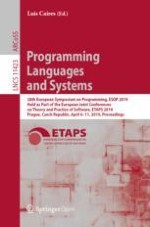Open Access 2019 | Open Access | Buch

Programming Languages and Systems
28th European Symposium on Programming, ESOP 2019, Held as Part of the European Joint Conferences on Theory and Practice of Software, ETAPS 2019, Prague, Czech Republic, April 6–11, 2019, Proceedings
herausgegeben von: Luís Caires
Verlag: Springer International Publishing
Buchreihe : Lecture Notes in Computer Science